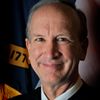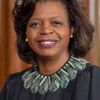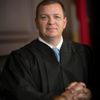North Carolina Supreme Court elections
There are seven justices on the North Carolina Supreme Court. For more information about these elections, visit the North Carolina judicial elections page.
Judicial selection
- See also: Judicial selection in North Carolina
The seven justices of the North Carolina Supreme Court are chosen through partisan elections. Justices are elected to eight-year terms and must face re-election if they wish to serve again.[1]
Qualifications
To serve on this court, a person must be licensed to practice law in North Carolina. There is a mandatory retirement age of 72 years.[2]
Chief justice
The chief justice of the supreme court is elected by voters to serve in that capacity for an eight-year term.[3]
Vacancies
In the event of a midterm vacancy, the governor appoints a successor to serve until the next general election which is held more than 60 days after the vacancy occurs. The governor must select an appointee from a list of three recommendations provided by the executive committee of the political party with which the vacating justice was affiliated.[4] An election is then held for a full eight-year term.[5][1]
The map below highlights how vacancies are filled in state supreme courts across the country.
Elections
Elections are held in even-numbered years. These elections were nonpartisan from 2004 to 2018.[6]
See also: North Carolina Supreme Court elections, 2030
Trey Allen's seat
There are no official candidates yet for this election.
Richard Dietz's seat
There are no official candidates yet for this election.
See also: North Carolina Supreme Court elections, 2028
Tamara Barringer's seat
There are no official candidates yet for this election.
Phil Berger Jr.'s seat
There are no official candidates yet for this election.
Paul Martin Newby's seat
There are no official candidates yet for this election.
North Carolina Supreme Court
See also: North Carolina Supreme Court elections, 2026
General election
The general election will occur on November 3, 2026.
The candidate list in this election may not be complete.
General election for North Carolina Supreme Court
Incumbent Anita Earls (D) and Sarah Stevens (R) are running in the general election for North Carolina Supreme Court on November 3, 2026.
Candidate | ||
 | Anita Earls (D) | |
 | Sarah Stevens (R) | |
 = candidate completed the Ballotpedia Candidate Connection survey. = candidate completed the Ballotpedia Candidate Connection survey. | ||||
| If you are a candidate and would like to tell readers and voters more about why they should vote for you, complete the Ballotpedia Candidate Connection Survey. | ||||
Do you want a spreadsheet of this type of data? Contact our sales team. | ||||
Democratic primary
The Democratic primary scheduled for March 3, 2026, was canceled. Incumbent Anita Earls (D) advanced from the Democratic primary for North Carolina Supreme Court without appearing on the ballot.
Republican primary
The Republican primary scheduled for March 3, 2026, was canceled. Sarah Stevens (R) advanced from the Republican primary for North Carolina Supreme Court without appearing on the ballot.
North Carolina Supreme Court
See also: North Carolina Supreme Court elections, 2024
General election
General election for North Carolina Supreme Court
Incumbent Allison Riggs (D) defeated Jefferson Griffin (R) in the general election for North Carolina Supreme Court on November 5, 2024.
Candidate | % | Votes | ||
| ✔ |  | Allison Riggs (D) | 50.0 | 2,770,412 |
 | Jefferson Griffin (R) | 50.0 | 2,769,678 | |
| Total votes: 5,540,090 | ||||
 = candidate completed the Ballotpedia Candidate Connection survey. = candidate completed the Ballotpedia Candidate Connection survey. | ||||
| If you are a candidate and would like to tell readers and voters more about why they should vote for you, complete the Ballotpedia Candidate Connection Survey. | ||||
Do you want a spreadsheet of this type of data? Contact our sales team. | ||||
Democratic primary
Democratic primary for North Carolina Supreme Court
Incumbent Allison Riggs (D) defeated Lora Cubbage (D) in the Democratic primary for North Carolina Supreme Court on March 5, 2024.
Candidate | % | Votes | ||
| ✔ |  | Allison Riggs | 69.1 | 450,268 |
 | Lora Cubbage | 30.9 | 201,336 | |
| Total votes: 651,604 | ||||
 = candidate completed the Ballotpedia Candidate Connection survey. = candidate completed the Ballotpedia Candidate Connection survey. | ||||
| If you are a candidate and would like to tell readers and voters more about why they should vote for you, complete the Ballotpedia Candidate Connection Survey. | ||||
Do you want a spreadsheet of this type of data? Contact our sales team. | ||||
Republican primary
The Republican primary scheduled for March 5, 2024, was canceled. Jefferson Griffin (R) advanced from the Republican primary for North Carolina Supreme Court without appearing on the ballot.
See also: North Carolina Supreme Court elections, 2022
Seat 5
General election
General election for North Carolina Supreme Court
Trey Allen (R) defeated incumbent Sam Ervin IV (D) in the general election for North Carolina Supreme Court on November 8, 2022.
Candidate | % | Votes | ||
| ✔ |  | Trey Allen (R)  | 52.2 | 1,957,440 |
 | Sam Ervin IV (D)  | 47.8 | 1,792,873 | |
| Total votes: 3,750,313 | ||||
 = candidate completed the Ballotpedia Candidate Connection survey. = candidate completed the Ballotpedia Candidate Connection survey. | ||||
| If you are a candidate and would like to tell readers and voters more about why they should vote for you, complete the Ballotpedia Candidate Connection Survey. | ||||
Do you want a spreadsheet of this type of data? Contact our sales team. | ||||
Democratic primary
The Democratic primary scheduled for May 17, 2022, was canceled. Incumbent Sam Ervin IV (D) advanced from the Democratic primary for North Carolina Supreme Court without appearing on the ballot.
Republican primary
Republican primary for North Carolina Supreme Court
Trey Allen (R) defeated April C. Wood (R) and Victoria Prince (R) in the Republican primary for North Carolina Supreme Court on May 17, 2022.
Candidate | % | Votes | ||
| ✔ |  | Trey Allen  | 55.4 | 385,124 |
 | April C. Wood | 36.3 | 252,504 | |
| Victoria Prince | 8.3 | 57,672 | ||
| Total votes: 695,300 | ||||
 = candidate completed the Ballotpedia Candidate Connection survey. = candidate completed the Ballotpedia Candidate Connection survey. | ||||
| If you are a candidate and would like to tell readers and voters more about why they should vote for you, complete the Ballotpedia Candidate Connection Survey. | ||||
Do you want a spreadsheet of this type of data? Contact our sales team. | ||||
Seat 3
General election
General election for North Carolina Supreme Court
Richard Dietz (R) defeated Lucy N. Inman (D) in the general election for North Carolina Supreme Court on November 8, 2022.
Candidate | % | Votes | ||
| ✔ |  | Richard Dietz (R) | 52.4 | 1,965,840 |
 | Lucy N. Inman (D)  | 47.6 | 1,786,650 | |
| Total votes: 3,752,490 | ||||
 = candidate completed the Ballotpedia Candidate Connection survey. = candidate completed the Ballotpedia Candidate Connection survey. | ||||
| If you are a candidate and would like to tell readers and voters more about why they should vote for you, complete the Ballotpedia Candidate Connection Survey. | ||||
Do you want a spreadsheet of this type of data? Contact our sales team. | ||||
Democratic primary
The Democratic primary scheduled for May 17, 2022, was canceled. Lucy N. Inman (D) advanced from the Democratic primary for North Carolina Supreme Court without appearing on the ballot.
Republican primary
The Republican primary scheduled for May 17, 2022, was canceled. Richard Dietz (R) advanced from the Republican primary for North Carolina Supreme Court without appearing on the ballot.
See also: North Carolina Supreme Court elections, 2020
Chief Justice
General election
General election for North Carolina Supreme Court
Paul Martin Newby (R) defeated incumbent Cheri Beasley (D) in the general election for North Carolina Supreme Court on November 3, 2020.
Candidate | % | Votes | ||
| ✔ |  | Paul Martin Newby (R)  | 50.0 | 2,695,951 |
 | Cheri Beasley (D) | 50.0 | 2,695,550 | |
| Total votes: 5,391,501 | ||||
 = candidate completed the Ballotpedia Candidate Connection survey. = candidate completed the Ballotpedia Candidate Connection survey. | ||||
| If you are a candidate and would like to tell readers and voters more about why they should vote for you, complete the Ballotpedia Candidate Connection Survey. | ||||
Do you want a spreadsheet of this type of data? Contact our sales team. | ||||
Democratic primary
The Democratic primary scheduled for March 3, 2020, was canceled. Incumbent Cheri Beasley (D) advanced from the Democratic primary for North Carolina Supreme Court without appearing on the ballot.
Republican primary
The Republican primary scheduled for March 3, 2020, was canceled. Paul Martin Newby (R) advanced from the Republican primary for North Carolina Supreme Court without appearing on the ballot.
Seat 2
General election
General election for North Carolina Supreme Court
Phil Berger Jr. (R) defeated Lucy N. Inman (D) in the general election for North Carolina Supreme Court on November 3, 2020.
Candidate | % | Votes | ||
| ✔ |  | Phil Berger Jr. (R) | 50.7 | 2,723,704 |
 | Lucy N. Inman (D) | 49.3 | 2,652,187 | |
| Total votes: 5,375,891 | ||||
 = candidate completed the Ballotpedia Candidate Connection survey. = candidate completed the Ballotpedia Candidate Connection survey. | ||||
| If you are a candidate and would like to tell readers and voters more about why they should vote for you, complete the Ballotpedia Candidate Connection Survey. | ||||
Do you want a spreadsheet of this type of data? Contact our sales team. | ||||
Democratic primary
The Democratic primary scheduled for March 3, 2020, was canceled. Lucy N. Inman (D) advanced from the Democratic primary for North Carolina Supreme Court without appearing on the ballot.
Republican primary
The Republican primary scheduled for March 3, 2020, was canceled. Phil Berger Jr. (R) advanced from the Republican primary for North Carolina Supreme Court without appearing on the ballot.
Seat 4
General election
General election for North Carolina Supreme Court
Tamara Barringer (R) defeated incumbent Mark A. Davis (D) in the general election for North Carolina Supreme Court on November 3, 2020.
Candidate | % | Votes | ||
| ✔ |  | Tamara Barringer (R) | 51.2 | 2,746,362 |
 | Mark A. Davis (D) | 48.8 | 2,616,265 | |
| Total votes: 5,362,627 | ||||
 = candidate completed the Ballotpedia Candidate Connection survey. = candidate completed the Ballotpedia Candidate Connection survey. | ||||
| If you are a candidate and would like to tell readers and voters more about why they should vote for you, complete the Ballotpedia Candidate Connection Survey. | ||||
Do you want a spreadsheet of this type of data? Contact our sales team. | ||||
Democratic primary
The Democratic primary scheduled for March 3, 2020, was canceled. Incumbent Mark A. Davis (D) advanced from the Democratic primary for North Carolina Supreme Court without appearing on the ballot.
Republican primary
The Republican primary scheduled for March 3, 2020, was canceled. Tamara Barringer (R) advanced from the Republican primary for North Carolina Supreme Court without appearing on the ballot.
North Carolina Supreme Court
See also: North Carolina Supreme Court elections, 2018
General election
General election for North Carolina Supreme Court
Anita Earls (D) defeated incumbent Barbara Jackson (R) and Chris Anglin (R) in the general election for North Carolina Supreme Court on November 6, 2018.
Candidate | % | Votes | ||
| ✔ |  | Anita Earls (D)  | 49.6 | 1,812,751 |
 | Barbara Jackson (R) | 34.1 | 1,246,263 | |
 | Chris Anglin (R) | 16.4 | 598,753 | |
| Total votes: 3,657,767 (100% precincts reporting) | ||||
 = candidate completed the Ballotpedia Candidate Connection survey. = candidate completed the Ballotpedia Candidate Connection survey. | ||||
| If you are a candidate and would like to tell readers and voters more about why they should vote for you, complete the Ballotpedia Candidate Connection Survey. | ||||
Do you want a spreadsheet of this type of data? Contact our sales team. | ||||
See also
External links
- Search Google News for this topic
- North Carolina State Board of Elections
- Follow The Money: National Institute on Money in State Politics
Footnotes
- ↑ 1.0 1.1 The University of North Carolina at Chapel Hill | School of Government, "History of North Carolina Judicial Elections," August 2020
- ↑ North Carolina Judicial Branch, "Judicial Qualifications Summary," September 28, 2016
- ↑ National Center for State Courts, "Methods of Judicial Selection: North Carolina," accessed September 20, 2021
- ↑ Ballotpedia Election Administration Legislation Tracker, "North Carolina S382," accessed December 19, 2024
- ↑ North Carolina General Assembly, "North Carolina Constitution - Article IV," accessed September 20, 2021 (Section 19)
- ↑ University of North Carolina at Chapel Hill | School of Government, "History of North Carolina Judicial Elections," accessed September 20, 2021
- ↑ General Assembly of North Carolina, "House Bill 222 / S.L. 2015-66," accessed March 7, 2016
- ↑ Ballot Access News, "North Carolina State Court Invalidates New Law Providing for Retention Elections for State Supreme Court Justices," March 4, 2016
- ↑ General Assembly of North Carolina, "North Carolina State Constitution," accessed March 7, 2016
- ↑ The News & Observer, "New uncertainties about NC Supreme Court elections," archived March 24, 2016
- ↑ WRAL, "Divided Supreme Court means no retention elections in NC for now," May 6, 2016
- ↑ North Carolina State Board of Elections, "General Election, Official Results," November 7, 2006
- ↑ North Carolina State Board of Elections, "General Election, Official Results," November 2, 2004
- ↑ North Carolina State Board of Elections, "General Election, Official Results," November 5, 2002
- ↑ North Carolina State Board of Elections, "General Election, Official Results for Office of Associate Justice of the Supreme Court," November 7, 2000
- ↑ North Carolina State Board of Elections, "General Election, Official Results for Office of Chief Justice of the Supreme Court," November 7, 2000
- ↑ North Carolina State Board of Elections, "General Election, Official Results for Office of Associate Justice of the Supreme Court - Wichard Seat," November 3, 1998
- ↑ North Carolina State Board of Elections, "General Election, Official Results for Office of Associate Justice of the Supreme Court - Webb Seat," November 3, 1998
- ↑ North Carolina State Board of Elections, "General Election, Official Results", November 2, 2010







